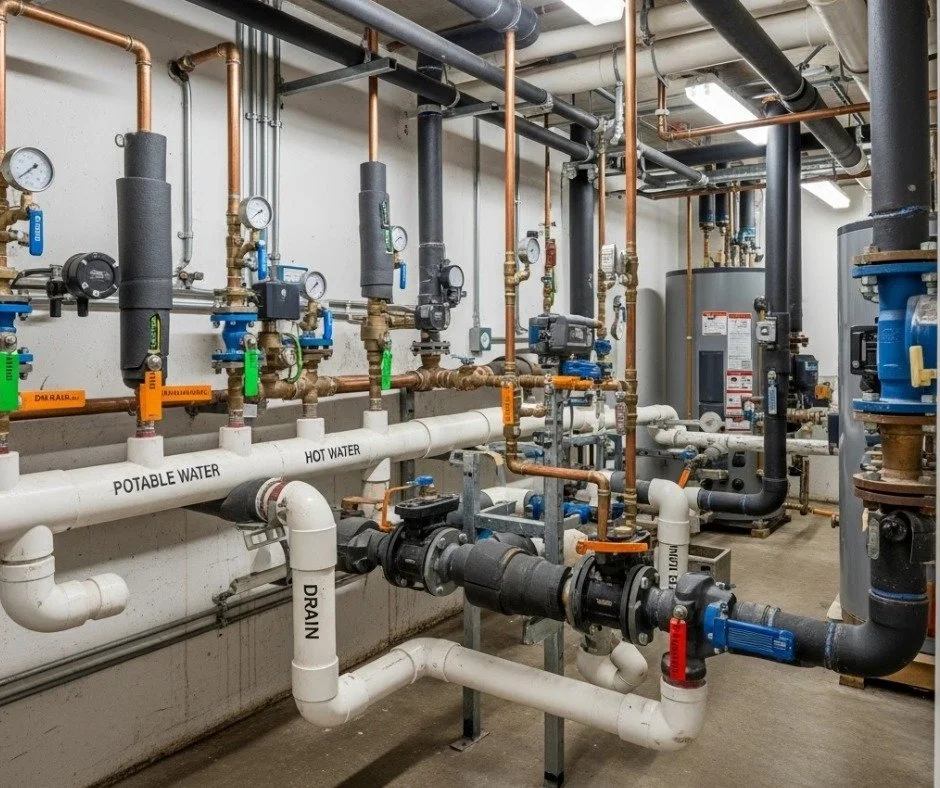How to Plan a Successful Commercial Plumbing Remodel in Denver
An outdated plumbing system in a commercial property can lead to costly repairs, water waste, and unhappy tenants or customers. For Denver businesses, a well-executed commercial plumbing remodel is more than a maintenance task it’s a strategic investment that boosts efficiency, enhances property value, and ensures compliance with local regulations. Whether you’re a property manager overseeing a multi-tenant office building or a developer planning a retail space overhaul, this guide provides a comprehensive roadmap for navigating the complexities of a plumbing remodel.
From assessing your current system to integrating cutting-edge technology, we’ll walk you through every step to ensure your project is cost-effective, innovative, and minimally disruptive.
The Commercial Plumbing Remodel Planning Checklist
A successful commercial plumbing remodel starts with a clear plan. By breaking the process into manageable steps, you can avoid common pitfalls and keep your project on track. Below is a detailed checklist tailored for Denver businesses.
Step 1: Initial Assessment and Goal Setting
Before diving into a plumbing remodel, take stock of your existing system. Look for signs of wear, such as frequent leaks, low water pressure, or outdated fixtures. For older buildings in Denver, corrosion in galvanized pipes or inefficient water heaters may signal the need for a comprehensive overhaul.
Next, define your project goals. Are you aiming for water conservation to reduce utility bills? Do you want to enhance the aesthetics of restrooms or kitchens to attract tenants? Perhaps compliance with Denver’s strict building codes is your primary concern. For example, the City and County of Denver’s Building Code requires commercial properties to meet specific standards for water efficiency and accessibility. Understanding these regulations early ensures your remodel aligns with legal requirements.
Consider working with a professional to conduct a thorough assessment. A licensed commercial plumbing contractor can identify hidden issues, such as underground leaks or outdated backflow prevention systems, that could derail your project if left unaddressed.
Step 2: Assembling Your Team and Choosing a Contractor
The success of your remodel hinges on selecting the right team, particularly a qualified commercial plumbing contractor. Unlike residential plumbers, commercial contractors specialize in large-scale systems, handling everything from high-capacity water heaters to complex piping networks. In Denver, look for contractors with a proven track record in commercial projects, verified licenses, and proper insurance.
To vet potential contractors, check references from other Denver businesses and review their work on platforms like Yelp or the Better Business Bureau. Ask about their experience with local building codes and their ability to handle unexpected challenges, such as navigating Denver’s historic building restrictions. A specialized commercial contractor will also have the expertise to manage multi-phase projects, ensuring minimal disruption to your operations.
Step 3: Budgeting and Cost Considerations
Budgeting for a commercial plumbing remodel requires careful planning. Costs can vary widely depending on the scope of the project, the size of the property, and the complexity of the plumbing system. On average, a commercial bathroom remodel in Denver can range from $10,000 to $50,000, with high-end projects exceeding $100,000 when extensive piping or custom fixtures are involved.
Key factors influencing commercial plumbing remodel costs include:
Demolition and preparation: Removing old pipes, fixtures, or flooring can be labor-intensive, especially in older buildings.
Commercial water heater installation: High-capacity or tankless water heaters can cost $5,000–$20,000, depending on the system.
Fixtures and materials: Upgrading to water-saving faucets or touchless systems adds to upfront costs but saves money long-term.
Labor: Denver’s competitive labor market means skilled contractors may charge a premium.
To avoid surprises, allocate 10–20% of your budget for contingencies, such as unforeseen pipe repairs or code compliance issues. Request detailed quotes from multiple contractors to compare costs and ensure transparency.
Innovative Solutions and Modern Plumbing Technology
Modern plumbing technology offers exciting opportunities to enhance efficiency, reduce costs, and improve user experience. By incorporating innovative solutions, Denver businesses can create plumbing systems that are both sustainable and future-proof.
Upgrading Commercial Plumbing Fixtures for Efficiency
Upgrading to modern commercial plumbing fixtures is a game-changer for property owners. Water-saving faucets, low-flow toilets, and touchless systems not only reduce water consumption but also appeal to environmentally conscious tenants and customers. For example, installing EPA WaterSense-certified fixtures can cut water usage by up to 30%, according to the Environmental Protection Agency.
Touchless faucets and flush valves are particularly popular in commercial restrooms, reducing maintenance costs and improving hygiene. These fixtures are ideal for high-traffic spaces like office buildings or retail centers in Denver’s bustling downtown. Additionally, sleek, modern designs can elevate the aesthetics of your property, making it more attractive to prospective tenants.
Advanced Water Heaters and Their Role in Remodeling
A commercial water heater installation is often a cornerstone of a plumbing remodel. Traditional tank water heaters are reliable but can be inefficient for large properties. Tankless water heaters, which heat water on demand, are gaining popularity for their energy efficiency and space-saving design. For a busy Denver restaurant or hotel, a tankless system can provide a consistent hot water supply while reducing energy bills by up to 40%, per Energy Star.
When planning your water heater upgrade, consider the property’s hot water demand, peak usage times, and available space. A commercial plumbing contractor can help you choose the right system and ensure proper installation to meet Denver’s energy efficiency standards.
Integrating Smart Plumbing Systems
Smart plumbing systems are revolutionizing commercial properties, offering smart plumbing solutions that enhance efficiency and prevent costly issues like leaks. Leak detection sensors, water usage monitors, and automated shut-off valves can prevent costly water damage and optimize efficiency. For example, a smart leak detection system can alert property managers to issues in real-time, minimizing downtime and repair costs.
In Denver, where water conservation is a priority due to the region’s semi-arid climate, smart systems can help businesses track usage and identify inefficiencies. These technologies also align with the Denver Water conservation goals, potentially qualifying your property for rebates or incentives.
Executing the Remodel and Minimizing Disruption
With a solid plan in place, the execution phase is where your vision comes to life. However, commercial plumbing remodels can disrupt business operations if not managed carefully. Here’s how to keep your project on track.
Creating a Project Timeline
A realistic timeline is essential for minimizing disruption. A typical commercial plumbing remodel in Denver can take anywhere from a few weeks to several months, depending on the project’s scope. For example, replacing fixtures in a single restroom might take 1–2 weeks, while a full-system overhaul could require 2–3 months.
Work with your contractor to develop a phased approach. For instance, if you manage a multi-tenant office building, consider remodeling one floor at a time to keep the property operational. Schedule noisy or disruptive tasks, like demolition, during off-hours to avoid disturbing tenants or customers. Be sure to account for Denver’s permitting and inspection processes, which can add 1–2 weeks to the timeline.
The Importance of Communication
Clear communication is the backbone of a successful remodel. Establish regular check-ins with your contractor to monitor progress and address issues promptly. For example, if unexpected pipe corrosion is discovered, your contractor should inform you immediately and propose solutions. Keeping stakeholders, such as tenants, employees, or investors informed about the project’s timeline and impact builds trust and minimizes complaints.
Use tools like project management software or simple email updates to streamline communication. In Denver’s fast-paced business environment, proactive communication ensures everyone stays on the same page.
Final Inspections and Post-Remodel Maintenance
Once the remodel is complete, a final inspection is critical to ensure compliance with Denver’s building codes. Your contractor should coordinate with the City and County of Denver’s permitting office to schedule inspections for plumbing, electrical, and accessibility standards.
After approval, establish a maintenance plan to protect your investment. Regular tasks, such as checking for leaks, cleaning fixtures, and servicing water heaters, can extend the life of your new system. Consider signing a maintenance contract with your commercial plumbing contractor to ensure ongoing care and quick response to any issues.
Conclusion: A Smart Investment for the Future
A commercial plumbing remodel is a significant undertaking, but with careful planning, it can deliver substantial benefits for Denver businesses. By conducting a thorough assessment, choosing the right contractor, budgeting wisely, and embracing modern technology, you can create a plumbing system that’s efficient, compliant, and built to last. Whether you’re upgrading a single restroom or overhauling an entire property, the steps outlined in this guide will help you achieve a successful outcome.
Ready to start your commercial plumbing remodel? Contact a reputable commercial plumbing contractor in Denver for a consultation and quote. Investing in a smart, efficient plumbing system today will pay dividends for years to come.
Frequently Asked Questions
-
An outdated plumbing system can manifest in several ways. Look for frequent leaks, low water pressure, or constantly high water bills. For older buildings, signs of corrosion in galvanized pipes or an inefficient water heater may indicate the need for a comprehensive overhaul. The article also suggests that a remodel might be necessary to enhance aesthetics, improve efficiency for water conservation, or ensure compliance with the City and County of Denver's strict building codes. A professional plumbing contractor can perform a thorough assessment to identify hidden issues and determine the scope of a remodel.
-
The cost of a commercial plumbing remodel can vary significantly based on the project's scope, the property's size, and the system's complexity. The article states that a commercial bathroom remodel in Denver can range from $10,000 to $50,000, with larger projects exceeding $100,000. Key factors influencing the cost include demolition and preparation, the installation of high-capacity water heaters ($5,000–$20,000), new fixtures, and labor. To avoid surprises, it's recommended to allocate 10–20% of your budget for contingencies and to request detailed quotes from multiple contractors.
-
Modern technology offers significant benefits for commercial properties. You can upgrade to water-saving fixtures, such as low-flow toilets and faucets certified by the EPA WaterSense program, to reduce water consumption by up to 30%. For high-demand properties, tankless water heaters are an energy-efficient alternative to traditional tank heaters, potentially reducing energy bills by up to 40%. The article also highlights smart plumbing systems with leak detection sensors and water usage monitors. These can prevent costly water damage, help you track usage, and align with Denver's water conservation goals, potentially qualifying your property for rebates or incentives.
READ MORE…
Smart Plumbing Solutions Every Property Owner and Developer Should Know
How Does Plumbing Work? What Your Plumber Knows That You Don't


